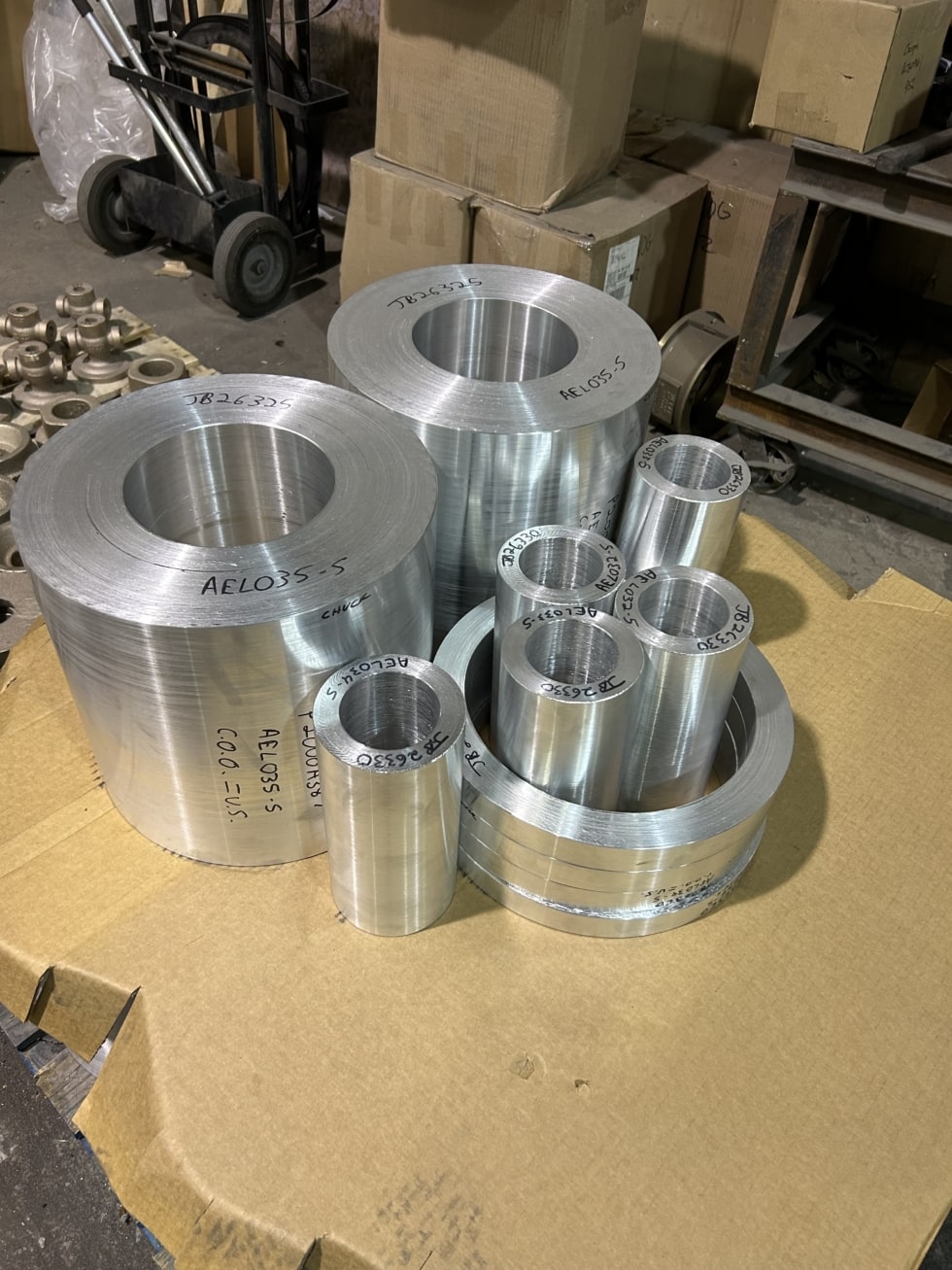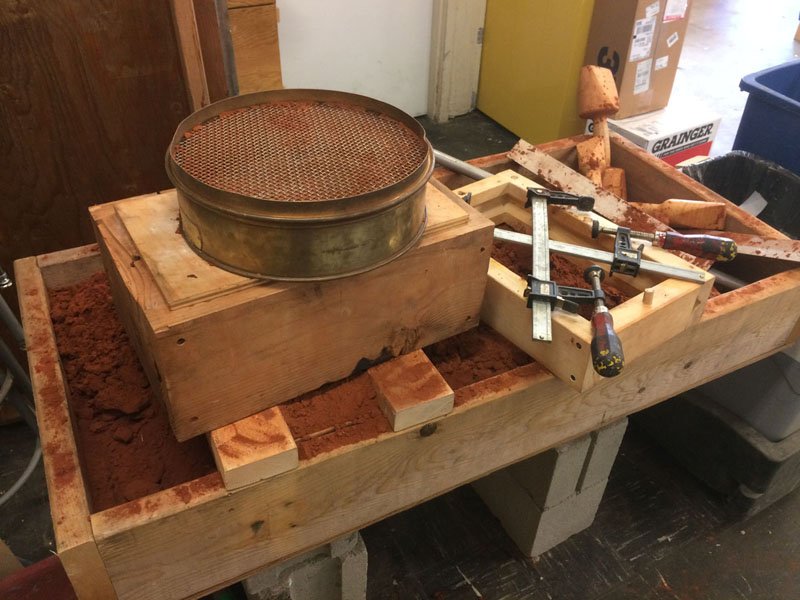Recognizing the Conveniences and Innovations in the Aluminum Foundry Sector
The Aluminum Foundry market plays a vital role in contemporary production. Its light-weight homes significantly enhance gas effectiveness, particularly in aerospace and vehicle fields. Furthermore, Aluminum's resistance to deterioration warranties long life in various applications. As the market evolves, advancements such as innovative recycling and additive manufacturing are reshaping production techniques. Exploring these improvements discloses not only the benefits yet also the difficulties ahead for Aluminum foundries in a swiftly changing market.
The Lightweight Advantage of Aluminum
Aluminum's lightweight nature supplies significant advantages across different industries, especially in production and transportation. Its low thickness enables for the production of parts that are less complicated to mount and take care of, resulting in lowered labor prices and enhanced efficiency. In the automobile market, lighter cars add to enhanced fuel economy and lower emissions, lining up with global sustainability goals. Likewise, in aerospace, the usage of Aluminum minimizes the overall weight of airplane, which is essential for enhancing efficiency and reducing operational prices.
Additionally, Aluminum's lightweight properties assist in innovative styles that were previously unfeasible with larger materials. This flexibility enables suppliers to create complex shapes and structures while preserving architectural stability. In general, the lightweight benefit of Aluminum not only improves item efficiency but also drives improvements in modern technology and style, making it a preferred material in numerous applications.
Deterioration Resistance and Sturdiness
The Aluminum Foundry industry is renowned for creating materials with premium corrosion resistance, making them optimal for numerous applications. This residential property, combined with improved structural integrity, adds to the durable efficiency benefits that Aluminum elements offer. As an outcome, sectors significantly count on Aluminum to satisfy demanding environmental conditions without endangering quality.
Superior Rust Resistance
While various steels face considerable obstacles from ecological aspects, Aluminum attracts attention for its exceptional corrosion resistance, making it a favored choice in many applications. This residential property is largely due to an all-natural oxide layer that forms on the Aluminum surface area, offering an obstacle versus moisture and destructive representatives. Unlike other steels that might rust or deteriorate gradually, Aluminum preserves its stability also in severe atmospheres, such as seaside locations or industrial setups. In addition, its light-weight nature combined with corrosion resistance makes it optimal for applications in aerospace, auto, and aquatic sectors. Generally, Aluminum's exceptional resilience not only enhances product longevity however likewise lowers maintenance costs, presenting a compelling benefit for manufacturers and customers alike.
Boosted Architectural Honesty
Developers and designers significantly identify the significance of improved architectural honesty in modern-day applications, where both rust resistance and longevity are vital. Aluminum alloys, known for their lightweight buildings, also show phenomenal resistance to rust, making them appropriate for rough atmospheres. The cutting-edge methods utilized in the Aluminum Foundry industry contribute significantly to generating components with improved longevity. Advanced casting procedures and alloy compositions are customized to fulfill specific efficiency needs, ensuring that structures can withstand severe conditions without jeopardizing honesty. Surface treatments and finishes boost the life-span of Aluminum items, additionally alleviating wear and tear over time. This emphasis on enhanced architectural integrity not just prolongs the functionality of materials but additionally minimizes maintenance costs, solidifying Aluminum's position as a product of option in numerous markets.
Long-lasting Performance Conveniences
Durable performance in Aluminum parts is mainly credited to their superior deterioration resistance and longevity. Unlike several steels, Aluminum normally develops a protective oxide layer, which avoids corrosion and degeneration in different atmospheres, including commercial and marine setups. This inherent building considerably expands the lifespan of Aluminum products, reducing upkeep and replacement prices. Additionally, the lightweight nature of Aluminum boosts its applicability throughout sectors without jeopardizing stamina. The material's resistance to use and tear additionally adds to its dependability sought after applications, making it a suitable selection for automotive, aerospace, and building and construction industries. As markets increasingly focus on sustainability and long life, Aluminum's efficiency advantages align with modern-day engineering needs, strengthening its function in ingenious manufacturing processes.
Environmental Effect and Sustainability
 As the Aluminum Foundry sector progresses, it progressively prioritizes ecological effect and sustainability, acknowledging the need for accountable techniques when faced with climate modification. Initiatives to minimize waste and power usage are at the forefront, with lots of factories taking on recycling campaigns to reclaim Aluminum scrap. This not just reduces basic material use but also especially lowers power expenditure, as recycled Aluminum calls for just a portion of the energy compared to main manufacturing.
As the Aluminum Foundry sector progresses, it progressively prioritizes ecological effect and sustainability, acknowledging the need for accountable techniques when faced with climate modification. Initiatives to minimize waste and power usage are at the forefront, with lots of factories taking on recycling campaigns to reclaim Aluminum scrap. This not just reduces basic material use but also especially lowers power expenditure, as recycled Aluminum calls for just a portion of the energy compared to main manufacturing.In addition, developments in discharges control modern technologies are being implemented to reduce air contaminants, aligning operations with stricter environmental regulations. Factories are additionally exploring alternate power sources, such as solar and wind, to power their facilities sustainably. By fostering partnership with stakeholders, the industry aims to establish ingenious remedies that enhance eco-friendly stewardship. Collectively, these campaigns highlight a dedication to lowering the Aluminum Foundry's carbon footprint while advertising a round economic climate within the manufacturing sector.
Advanced Production Techniques
 Reinventing manufacturing processes, the Aluminum Foundry sector is significantly incorporating sophisticated manufacturing strategies to boost effectiveness and precision. Methods such as computer mathematical control (CNC) machining and additive manufacturing have emerged as necessary elements in enhancing manufacturing workflows. CNC machining enables for high-precision component construction, significantly decreasing material waste and manufacturing time. Meanwhile, additive production opens up new avenues for complicated geometries and lightweight styles that were formerly hard to accomplish.
Reinventing manufacturing processes, the Aluminum Foundry sector is significantly incorporating sophisticated manufacturing strategies to boost effectiveness and precision. Methods such as computer mathematical control (CNC) machining and additive manufacturing have emerged as necessary elements in enhancing manufacturing workflows. CNC machining enables for high-precision component construction, significantly decreasing material waste and manufacturing time. Meanwhile, additive production opens up new avenues for complicated geometries and lightweight styles that were formerly hard to accomplish.Additionally, the implementation of automation and robotics in navigate to this website Aluminum foundries streamlines procedures, decreases human error, and enhances worker security. These technologies assist in a more receptive production setting, allowing manufacturers to adapt swiftly to market needs. The assimilation of sophisticated simulation software even more boosts the style and testing stages, leading to exceptional item high quality. Jointly, these methods not only boost functional efficiency but likewise foster development, positioning the Aluminum Foundry sector at the forefront of modern-day production.
Technologies in Recycling Processes
The Aluminum Foundry sector is not only progressing in making methods but is likewise making significant strides in recycling processes. Developments are arising to boost the effectiveness of reusing approaches, minimizing energy intake and enhancing sustainability. Advanced sorting technologies, such as automated optical sorting, allow the identification and separation of Aluminum from various other products with high accuracy. This leads to a better of recycled Aluminum, which is necessary for preserving the integrity of the additional info last products.
Furthermore, closed-loop recycling systems are being applied, enabling producers to recycle Aluminum scrap within their own production procedures. This lessens waste and promotes a round economic situation. In addition, study right into brand-new recycling techniques, such as hydrometallurgical procedures, supplies the possibility for recuperating Aluminum from complex waste streams. These advancements not only contribute to reducing the carbon impact of the Aluminum Foundry industry yet additionally boost its economic feasibility in a progressively environmentally aware market.
Applications Across Different Industries
Many sectors are significantly acknowledging the versatility and advantages of Aluminum Foundry items, causing prevalent applications throughout sectors such as vehicle, aerospace, consumer, and building and construction products. In the automotive market, Aluminum castings add to lightweight automobile designs, enhancing gas performance and efficiency. Aerospace makers utilize Aluminum parts for their strength-to-weight ratio, important for airplane frameworks and components.
In building and construction, Aluminum is favored for its sturdiness and resistance to deterioration, making it optimal for window structures, roof, and structural assistances. Durable goods also profit from Aluminum Foundry products, as seen in kitchenware, electronic devices, and product packaging, where lightweight and recyclable products are important.
The flexibility of Aluminum Foundry techniques permits complex designs and accurate specs, accommodating the diverse demands of these sectors. Because of this, Aluminum Foundry items are ending up being integral to modern production procedures across various sectors.
Future Trends in Aluminum Foundries
As sectors continue to advance, Aluminum factories are poised to accept numerous crucial fads that assure to boost effectiveness and sustainability. One famous fad is the raising adoption of digital modern technologies, consisting of automation and expert system, which enhance operations and enhance quality assurance. Furthermore, the press towards lasting practices is leading shops to buy recycling innovations, greatly decreasing waste and power usage.
 Another arising fad is using advanced alloys and materials, accommodating the growing need for sturdy and lightweight parts throughout various fields (Aluminum Foundry). The assimilation of additive production techniques is prepared for to reinvent component style, providing personalization and minimizing lead times.
Another arising fad is using advanced alloys and materials, accommodating the growing need for sturdy and lightweight parts throughout various fields (Aluminum Foundry). The assimilation of additive production techniques is prepared for to reinvent component style, providing personalization and minimizing lead times.Collaboration with study establishments is likewise anticipated to drive development, as foundries seek to establish new processes and products. you can try this out Aluminum Foundry. Jointly, these patterns suggest a transformative future for the Aluminum Foundry industry, aligning with wider objectives of sustainability and effectiveness
Regularly Asked Inquiries
What Are the Regular Expenses Related To Aluminum Foundry Manufacturing?
The typical costs related to Aluminum Foundry manufacturing consist of basic materials, labor, power, tools upkeep, and overhead costs. These aspects jointly influence the overall financial investment needed for effective Aluminum spreading procedures.
How Does Aluminum Contrast to Various Other Steels in Strength?
Aluminum, while lighter than several metals, exhibits outstanding strength-to-weight ratios. Contrasted to steel, Aluminum is much less strong but supplies excellent rust resistance, making it a beneficial option in applications where weight and durability are necessary.
What Precaution Remain In Area in Aluminum Foundries?
Safety and security steps in Aluminum factories typically consist of obligatory personal protective devices, air flow systems to control fumes, routine devices maintenance, training programs for staff members, and adherence to rigorous security policies to minimize dangers connected with liquified steel handling.
Just How Is Quality Assurance Managed in Aluminum Casting Processes?
Quality control in Aluminum casting processes entails strenuous examinations at numerous phases, including raw product analysis, procedure monitoring, and final product screening. Techniques such as analytical process control and non-destructive screening warranty adherence to market requirements.
What Accreditations Are Necessary for Aluminum Foundry Distributors?
The importance of certifications for Aluminum Foundry providers consists of ISO 9001 for quality monitoring, ISO 14001 for environmental management, and industry-specific criteria like ASTM and SAE, making certain conformity, security, and reliability in producing procedures.
The Aluminum Foundry sector plays an essential role in modern production. The Aluminum Foundry sector is renowned for creating materials with superior corrosion resistance, making them optimal for numerous applications. Changing manufacturing processes, the Aluminum Foundry sector is progressively incorporating advanced production strategies to improve performance and precision. The Aluminum Foundry industry is not only progressing in making strategies however is additionally making significant strides in recycling processes. As markets continue to develop, Aluminum shops are poised to embrace several crucial patterns that guarantee to boost effectiveness and sustainability.